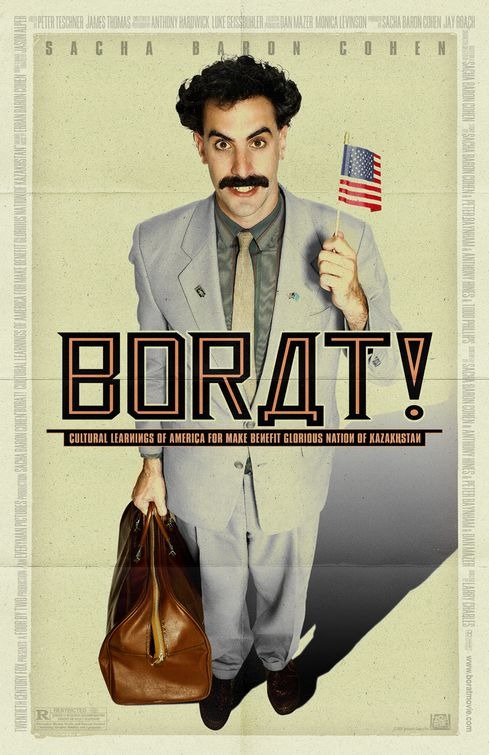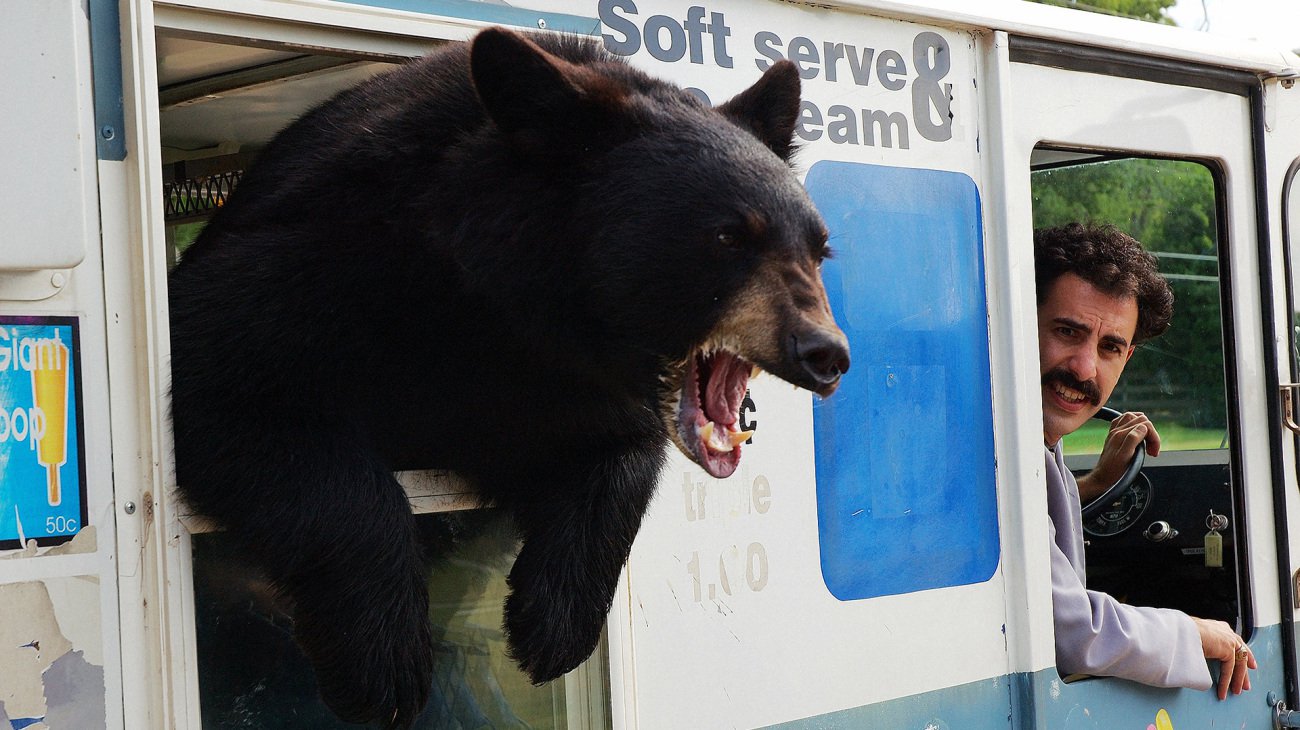
I like. Very nice.
The short version: yes, Borat really is as funny as you've been led to believe. I'm not going to explain why, becuase I think there are jokes that should be left unspoiled that have already been spoiled by just about every review of the film that exists.
The long version is a bit tricky, and doesn't have to do with what goes on in the film so much as with what the film is.
If you somehow didn't manage to know the film, whose full title is Borat: Cultural Learnings of America for Make Benefit Glorious Nation of Kazakhstan, which I quote in full this one time because I really enjoy typing it out, is cenetered around the "Borat" character created by British comedian Sacha Baron Cohen for Da Ali G Show. Like all of Cohen's repertoire, Borat was a persona the comedian would adopt to interview subjects who were unaware that he is really an actor.
In the film, Borat is sent by his native Kazakhstan to film a documentary on American culture, to bring back some idea of the civilized west to the stone-aged former Soviet republic. The "documentary" consists of Borat wandering from vignette to vignette, acting hugely inappropriately and causing general discomfort to the people he met. Along the way, a plot involving Pamela Anderson creeps in.
You don't have to go very far to find people comparing Borat to Jackass or Punk'd. I'd like very badly to claim that those comparisons are indefensible, but they're not, really. Assuming that you're willing to ignore tone and intent. Borat, after all, is a satire, and being British it is an extraordinarily mean-spirited one. I don't want that to come off as a complaint; the unmitigated nastiness of the film is precisely why it works more than just a run-of-the-mill "gotcha!" comedy. Cohen and company are out to expose the hypocrisy of Americans (and not just the red states, mind you), and that's not something to take lightly.
That's all very obvious, and judgments of how honest the satire is, who comes off the worst, and whether it's too stagey, they're all ten-a-penny. If you've seen the film, you already know it's a satire, and if you haven't, I'm not going to pick apart every gag to see how it ticks because that's just not fair.
What's interesting to me is how Borat implicates its audience. It's a very voyeuristic, even pornographic film, and if Cohen is being cruel to his victims, it's very hard to deny that we who laugh are doing the same thing. Why do we find it funny? It would be easy to call it our sense of intellectual superiority, but I don't think that's quite it.
Here's a story that seems unconnected, but isn't: the company I work for recently hosted a seminar for a group of executives from across the Middle East. Now, I didn't get a chance to interact with them, but one my coworkers who did shared an anecdote. Apparently, during a day trip into Chicago, the executives and my coworker found themselves window-shopping along Michigan Avenue, the Magnificent Mile. One of the men, seeing the stores and buildings and all that, exclaimed, "It's just like Beirut!"
My gut reaction, and that of my coworkers, was disbelief. Beirut looks like downtown Chicago? But...Chicago is American! And Beirut is, like, the desert!
Borat has come under fire for its representation of Kazakhstanis, and for its depiction of that country, which is largely illiterate, pre-electrical, and in all ways as backwards as it can be, and all of this is hysterical. That is point 1. Borat mines most of its satire from people who are too thick to realize that Cohen's outlandish caricature of a Eurasian is fake, and they bend over backwards to accomodate the Exotic Ways of this Strange Foreigner. That is point 2.
Myself and my coworkers, well-intentioned liberals all, were shocked that Beirut has the infrastructure of a First World city, including one among us who has family in Israel and who travels to the Middle East every year. That is point 3.
The joke in Borat isn't just on the rubes in Alabama who don't recognise a British-born Jew when they see one; it's on the audience. Laughing at the antics of a cartoon Kazakhstani is fine, and laughing at people who don't get that he's a cartoon is also fine, but when you're laughing at them simultaneously? That takes satire and puts it somewhere that I didn't even know exists. The line between laughint at Borat and laughing with Cohen is a thin one, and as the film progresses we find ourselves on both sides of that line. And when we're on one side, we are exactly the same as the people that we're laughing at on the other side.
And it's not just that we're all bigots. Remember above, I mentioned the film's cruelty...it's not just cruel to the people in the film. It's painful and embarassing and squirmy for the audience. We are just as uncomfortable - more, probably - as anyone in the film. As Cohen skewers the idiots onscreen, the very smart people in the dark go through a kind of self-inflicted emotional torture. We don't identify with the onscreen victims, we are the victims. That's why I like the idea that larger parts of the film were staged than is obvious: it makes the whole thing a giant brainfuck, an excercise in tweaking the audience, making us confront what we think and what we know, and what kind of people are we for laughing at these poor innocent idiots, when we know that we're smarter, and yet we're basically acting just like them...frankly, it's one of the most exhilirating attacks on the audience I've ever seen, an assault on par with the work of Lynch, Haneke or Kubrick. It's the nastiest film of 2006, and I could not mean that in a nicer way.
The long version is a bit tricky, and doesn't have to do with what goes on in the film so much as with what the film is.
If you somehow didn't manage to know the film, whose full title is Borat: Cultural Learnings of America for Make Benefit Glorious Nation of Kazakhstan, which I quote in full this one time because I really enjoy typing it out, is cenetered around the "Borat" character created by British comedian Sacha Baron Cohen for Da Ali G Show. Like all of Cohen's repertoire, Borat was a persona the comedian would adopt to interview subjects who were unaware that he is really an actor.
In the film, Borat is sent by his native Kazakhstan to film a documentary on American culture, to bring back some idea of the civilized west to the stone-aged former Soviet republic. The "documentary" consists of Borat wandering from vignette to vignette, acting hugely inappropriately and causing general discomfort to the people he met. Along the way, a plot involving Pamela Anderson creeps in.
You don't have to go very far to find people comparing Borat to Jackass or Punk'd. I'd like very badly to claim that those comparisons are indefensible, but they're not, really. Assuming that you're willing to ignore tone and intent. Borat, after all, is a satire, and being British it is an extraordinarily mean-spirited one. I don't want that to come off as a complaint; the unmitigated nastiness of the film is precisely why it works more than just a run-of-the-mill "gotcha!" comedy. Cohen and company are out to expose the hypocrisy of Americans (and not just the red states, mind you), and that's not something to take lightly.
That's all very obvious, and judgments of how honest the satire is, who comes off the worst, and whether it's too stagey, they're all ten-a-penny. If you've seen the film, you already know it's a satire, and if you haven't, I'm not going to pick apart every gag to see how it ticks because that's just not fair.
What's interesting to me is how Borat implicates its audience. It's a very voyeuristic, even pornographic film, and if Cohen is being cruel to his victims, it's very hard to deny that we who laugh are doing the same thing. Why do we find it funny? It would be easy to call it our sense of intellectual superiority, but I don't think that's quite it.
Here's a story that seems unconnected, but isn't: the company I work for recently hosted a seminar for a group of executives from across the Middle East. Now, I didn't get a chance to interact with them, but one my coworkers who did shared an anecdote. Apparently, during a day trip into Chicago, the executives and my coworker found themselves window-shopping along Michigan Avenue, the Magnificent Mile. One of the men, seeing the stores and buildings and all that, exclaimed, "It's just like Beirut!"
My gut reaction, and that of my coworkers, was disbelief. Beirut looks like downtown Chicago? But...Chicago is American! And Beirut is, like, the desert!
Borat has come under fire for its representation of Kazakhstanis, and for its depiction of that country, which is largely illiterate, pre-electrical, and in all ways as backwards as it can be, and all of this is hysterical. That is point 1. Borat mines most of its satire from people who are too thick to realize that Cohen's outlandish caricature of a Eurasian is fake, and they bend over backwards to accomodate the Exotic Ways of this Strange Foreigner. That is point 2.
Myself and my coworkers, well-intentioned liberals all, were shocked that Beirut has the infrastructure of a First World city, including one among us who has family in Israel and who travels to the Middle East every year. That is point 3.
The joke in Borat isn't just on the rubes in Alabama who don't recognise a British-born Jew when they see one; it's on the audience. Laughing at the antics of a cartoon Kazakhstani is fine, and laughing at people who don't get that he's a cartoon is also fine, but when you're laughing at them simultaneously? That takes satire and puts it somewhere that I didn't even know exists. The line between laughint at Borat and laughing with Cohen is a thin one, and as the film progresses we find ourselves on both sides of that line. And when we're on one side, we are exactly the same as the people that we're laughing at on the other side.
And it's not just that we're all bigots. Remember above, I mentioned the film's cruelty...it's not just cruel to the people in the film. It's painful and embarassing and squirmy for the audience. We are just as uncomfortable - more, probably - as anyone in the film. As Cohen skewers the idiots onscreen, the very smart people in the dark go through a kind of self-inflicted emotional torture. We don't identify with the onscreen victims, we are the victims. That's why I like the idea that larger parts of the film were staged than is obvious: it makes the whole thing a giant brainfuck, an excercise in tweaking the audience, making us confront what we think and what we know, and what kind of people are we for laughing at these poor innocent idiots, when we know that we're smarter, and yet we're basically acting just like them...frankly, it's one of the most exhilirating attacks on the audience I've ever seen, an assault on par with the work of Lynch, Haneke or Kubrick. It's the nastiest film of 2006, and I could not mean that in a nicer way.






